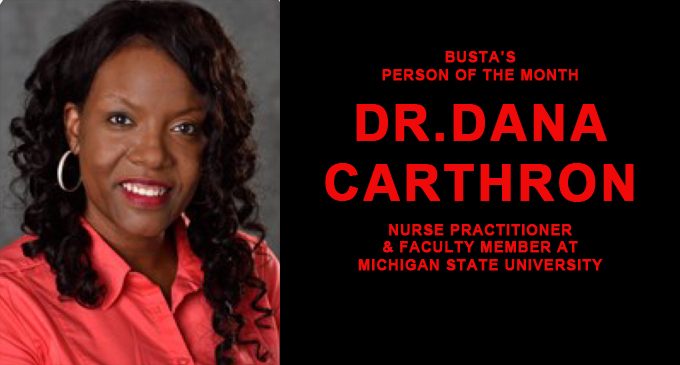Busta’s Person of the Week: Dr. Dana Carthron shares facts, dispels myths about COVID-19
Dr. Dana Carthron, nurse practitioner and faculty member at Michigan State University’s division of public health, College of Human Medicine and the College of Nursing

By Busta Brown
Please take this very seriously! Superstar celebrities such as actor Idris Elba and his wife, pop singer Pink, NBA superstars Donovan Mitchell and teammate Rudy Gobert, just to name a few, had all tested positive for COVID-19. Add to that the many cases here in North Carolina and well over a million cases worldwide.
Yet, during a recent visit at the grocery store, I couldn’t believe my eyes. There were maybe five customers wearing masks and a lot less wearing gloves. What was even more alarming was the less than six feet of social distancing and people engaging in conversation with strangers. There were customers touching fruit and vegetables with their bare hands and then putting them back in the pile, as if the COVID-19 pandemic doesn’t exist.
I read and watch the news for daily updates and it’s gotten my attention. For that reason, Dr. Melicia Whitt-Glover and I decided to interview Dr. Dana Carthron on our radio show, “Your Health Matters.” We learned some life-saving information and also some life-threatening myths were dispelled that are circulating on social media.
Dr. Dana Carthron is a nurse practitioner and faculty member at Michigan State University in the division of public health, which is in the College of Human Medicine and also the College of Nursing. She’s also a good friend of Health Sciences at Winston-Salem State University.
“I don’t think everyone understands the magnitude of what’s going on,” said Dr. Carthron. “A lot of people aren’t taking this pandemic seriously, and it’s time that we start,” she continued.
Dr. Carthron reviewed the symptoms, for those who may not be aware. “It starts off with a cough that can become unmanageable. Then you get a fever, we’re talking over 101 (degrees). It gets progressive, major fatigue and headaches. Some people have a stomachache. The big thing is differentiating it from the flu. The flu is a rapid onset, but the coronavirus takes a little bit of time. So you could be exposed today, but it might be a week before you get any symptoms. And you’re most contagious when you are exhibiting symptoms, so you have to be super careful,” said Dr. Carthron.
According to the CDC, anyone exposed to COVID-19 should self-quarantine for 14 days. Asked when it’s safe to come out of quarantine, Dr. Carthron replied, “After the 14 days, if you don’t have symptoms, then you’re OK.”
Dr. Whitt-Glover asked: how do we know if we’re exposed to someone with the virus if they weren’t tested? Dr. Carthron’s answer is why we need to take this stay-at-home order more seriously. She said, “You don’t know if someone has the virus, that’s why it’s important to stay home. … When you stay at home, you can monitor yourself to see if you have any symptoms. When we’re out in public, everyone’s elbow to elbow and that’s extremely dangerous, because you have no clue who has what or touched what. If someone coughs, the virus could float around in the air for two to three hours, and you can contract it by inhaling,” Dr. Carthron said. She also mentioned that the virus could last 24 hours on cardboard and 9 hours on metal.
I asked Dr. Carthron if I should continue to allow my son to play outside with his friends. “No! Absolutely not! But you don’t have to keep children in the house, because we want them to get that exercise and some fresh air. However, they don’t need to play with anyone other than who’s living in the home. The reason I say that, you don’t know what’s going on in your neighbor’s house. They could be the cleanest people on the planet, but they can bring the virus home,” she replied.
I had to teach my seven-year-old Nate how to social distance himself from our neighbor’s children, and that was extremely difficult. We live in a cul-de-sac and our neighborhood is one big happy family, so it’s tough to stay away. I asked another doctor at Novant Health if my neighbors and I should begin social distancing. “No matter how long or how well you know your neighbors, you must practice social distancing from each other,” he replied. Dr. Carthron added, “It’s time to teach our children some old school games like Jaxx, marbles, and even spades,” and we all busted out laughing. She continued, “We have to be creative in order to be safe and stay healthy and alive.” She also added, “If you’re dating, no more booty calls. Find other ways.”
I love Dr. Carthron’s raw and very real approach because this is extremely serious and we need more health professionals like her. Dr. Whitt-Glover got real as well. “I was at the grocery store and a good friend of mine approached me to give me a hug. It was his natural inclination because I hadn’t seen him in a while. He tried to give me the fist bump, and I was like, you better take this elbow.” Of course, we cracked up laughing.
Dr. Carthron expanded on why we must take social distancing with the utmost urgency. “I have friends in Flint, Michigan, who are in the hospital, and two friends with family members that have died from the coronavirus. These are people that didn’t travel out of state or even in the same circle. And it’s happening every day,” said Dr. Carthron.
She shared her new normal: “I keep hand sanitizer with me at all times, it’s like a gun in a holster. That is my weapon, because when you insert your credit or debit card, touch money, groceries, anything, you must protect yourself. If you go to the park to give your children some exercise, wear gloves and wipe everything down. Protect your children. When you get back in your car, wipe everything down. And you must hand wash as well, at least 20-30 seconds.”
Dr. Whitt-Glover added how important it is to wipe everything down before you go inside your home, “… because the people inside will touch what you bring in, and we don’t want to put our families at risk.” She asked Dr. Crathron why everyone can’t get tested, so we know who has the virus and who doesn’t. She answered, “We don’t have enough test kits. Remember, it’s not just in the United States, this is worldwide.” She also shared how people are tested. “The test looks simple initially, because you see this beautiful little Q-Tip, but it’s super long and it feels like it’s going into your brain. But don’t let that throw you off. If you have the symptoms, you do need to get tested, so let’s get it done. But before you decide to get tested, you really need to talk to your (health care) provider, because the hospitals and testing sites are overly crowded,” she said.
Dr. Whitt-Glover added, “If you go get tested, it’s very crowded and you’ll be elbow to elbow with people that are positive, and you might not have it then, but …” Dr. Carthron said anyone that is on immunosuppressive drugs and older adults are at a higher risk to contract the COVID-19 virus. If you think you have the symptoms, avoid going outside and exposing others. Instead, schedule virtual visits with your doctor. That will lower your risk of you contracting the virus as well.
Now, let’s talk about some of the myths we hear that can cure COVID-19. If you drink warm liquids, gurgle with Listerine, get out in the sun … “None of that’s true! Lysol is good to use to disinfect your house, but once the virus is inside your system, it won’t have any affect. And if sunlight killed the virus, why are we asked to stay inside? Come on! So, please be careful when you hear these myths and check with your health care provider and the CDC website before you do anything,” said Dr. Crathron. There’s also a rumor that black people can’t contract the virus and Dr. Carthron’s response hit home, “Everyone I know that has the virus or died from it are all black. The biggest jump in cases is in Wade County, which is near Detroit, Michigan. And it’s also not true that if you’re healthy, the virus can’t kill you,” she said.
Dr. Carthron added that black men don’t visit their doctors as often as we should. Dr. Carthron said the best way to prevent illnesses such as high blood pressure, kidney disease, diabetes, hypertension, and heart disease, is for us black men to visit our doctor more often. If you have any of these illnesses, you often have a weaken immune system putting you at risk to contract COVID-19. So you owe it to yourself to get educated, because your health matters.
















